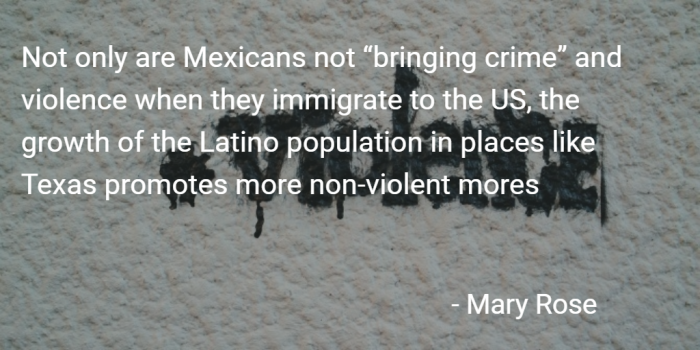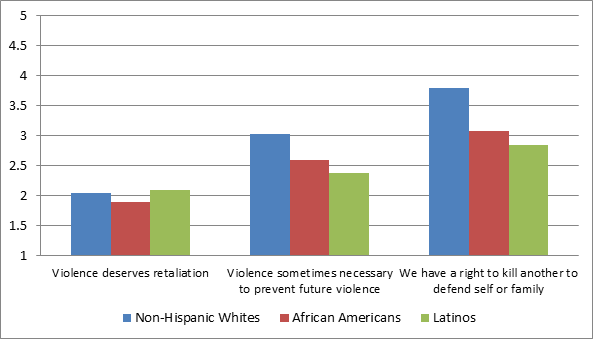 This year’s presidential election campaign has been marked by Republican nominee Donald Trump’s rhetoric towards Latino immigrants which characterizes them as more likely to commit violent crimes. But that portrayal is far from the truth, writes Mary Rose. In a new study of attitudes towards violence, she finds that Latinos are less likely than whites to believe that violence is necessary to prevent future violence or that people have a right to kill someone in self-defense.
This year’s presidential election campaign has been marked by Republican nominee Donald Trump’s rhetoric towards Latino immigrants which characterizes them as more likely to commit violent crimes. But that portrayal is far from the truth, writes Mary Rose. In a new study of attitudes towards violence, she finds that Latinos are less likely than whites to believe that violence is necessary to prevent future violence or that people have a right to kill someone in self-defense.
In announcing his presidential bid last summer, Donald Trump (in)famously declared that Mexico was sending people who were not “their best.” Instead Mexico was “sending people that have lots of problems…they’re bringing crime. They’re rapists.” Trump’s remarks reflect and contribute to an age-old perception that immigration increases crime and violence. Not only do criminologists fully refute this notion, new research from my colleague Christopher Ellison of The University of Texas at San Antonio and I shows why Trump was so very wrong. Compared to whites, particularly to Southern white males, Latino immigrants and their descendants are less likely to believe that violence is a proper way to solve a problem. To the extent that people’s tolerance and support for violence contributes to violent acts, our data suggests that Latinos have a lot more to fear from living in the US than the US has to fear from them.
The Latino Paradox and the US Culture of Honor
Latinos, including foreign-born Latino immigrants, commit less crime than would be expected by their disadvantaged social position. This is one aspect of what sociologists, criminologists, and public health researchers have dubbed the “Latino Paradox.” (Latinos also have better health outcomes than would be expected by their poverty and education rates.) Crime is also linked to immigrant generation: the odds of a first-generation immigrant (people born outside of the United States) engaging in crime are lower than those for their second-generation children, who are also less likely to commit crime than third-generation individuals. In other words, crime is more likely if Latinos have spent more time in the US, not less.
Considering these results, Harvard sociologist Robert Sampson has suggested that, in all likelihood, immigrants bring different ideas and beliefs about the appropriateness of violence (“non-violent mores”) and that these beliefs compete with the United States’ “high-violence society.” In this view, immigrants, including those from Mexico, disrupt the common “culture of honor” that pervades parts of the US. Decades of research supports the notion that violence is higher among people who believe, for example, that they cannot simply walk away from altercation with their self-esteem intact or that there is something wrong – and weak – with non-violent responses to anger, threats, or insults. Not only are these beliefs more common in the southern and western (frontier) areas of the US, these views also tend to be patterned along racial lines. We have known for some time that Whites (particularly Southern Whites) are more likely than African Americans to endorse violence – for example, to support people who act in self-defense or to believe that it is acceptable to use violence to prevent future violence.
Unfortunately, no research has clearly shown that Latinos or that immigrants from places like Mexico do, in fact, have different views about violence than do whites or African Americans in the US Indeed, according to some research, Latin American societies may foster their own “culture of honor,” with some evidence showing that Latinos tend to be tolerant of some kinds of violence, particularly violence in the context of an intimate relationship . So although some may expect that the lower level of violence among Latinos, including Latino immigrants, is linked to different attitudes, this link had not been clearly shown. We had the opportunity to examine whether there is such a link by studying violence mores across racial and ethnic groups through a survey of adults in Texas.

In the survey, respondents reported how much they agreed (on a five-point scale) with statements such as, “Violence deserves retaliation with violence”; “It is sometimes necessary for individuals to use violence against other individuals to prevent future violence”; and “A person should have the right to kill another person to defend oneself or one’s family.” Although the data come from a single state, Texas turns out to be a great place to study Latino immigration into a culture that tends to hold pro-violence mores. The eastern portions of Texas resemble more deeply southern states, and Texas also has a number of rural and frontier areas. Immigration to Texas is primarily from Mexico, and the survey included Spanish-speaking immigrants (who were allowed to take the survey in Spanish) as well as Latinos, Whites, and African Americans born both in Texas and other parts of the US.
The basic descriptive pattern is shown in Figure 1. Non-Hispanic Whites were the most likely to agree that violence is sometimes necessary to stop future violence and that we have an affirmative right to kill in self-defense; Latinos were the least likely to agree with these items, with African Americans in between the two. (Very few people agreed with the notion that violence deserves retaliation, and the racial and ethnic groups did not differ on this measure.) Obviously respondents differ from one another in many ways besides race and ethnicity, such as by gender, education, income, etc. Our analyses controlled for these types of demographic factors as well as for measures of conservatism, how often they went to church, and how fundamentalist they were in their religious beliefs, as well as the types of areas in which they lived (e.g., rural or urban their area is). Even with all these controls, Latinos were less likely than non-Hispanic Whites to agree with these two items (African Americans were, too, but differences from Whites were smaller).
Figure 1- Attitudes towards use of violence by ethnicity

Note: Higher values indicate greater agreement with an item. Values with different letters differ at p < .05.
The data also indicated that assimilation into the US is associated with more pro-violence mores. Above and beyond their Latino identity, people who took the survey in Spanish were more likely to disagree with all of the items. We also re-ran our models to check for diversity in views within the Latinos population depending on where people were born. We categorized Latinos in our sample in terms of whether they were born in Texas, were born outside the US and were not citizens, were citizens but not native to Texas, and all other Latinos. Results remained largely the same, and most of these subgroups of Latinos continued to have significantly different views of violence than whites (except, again, on the retaliation item). This suggests that even if Mexico has its features of a culture of honor, it does promote the kinds of approval of violence found among non-Hispanic Whites in a Southern state.
In other words, not only are Mexicans not “bringing crime” and violence when they immigrate to the US, the growth of the Latino population in places like Texas promotes more non-violent mores and may, over time, make the US a bit less tolerant towards using violence to solve problems.
This article is based on the paper, “Violence as Honorable? Racial and Ethnic Differences in Attitudes Toward Violence”, in Crime & Delinquency.
Featured image credit: alainalele (Flickr, CC-BY-2.0)
Please read our comments policy before commenting.
Note: This article gives the views of the author, and not the position of USAPP– American Politics and Policy, nor of the London School of Economics.
Shortened URL for this post: http://bit.ly/29mcctm
_________________________________
 Mary Rose – University of Texas at Austin
Mary Rose – University of Texas at Austin
Mary Rose is Associate Professor of Sociology at the University of Texas at Austin. Her scholarship examines lay participation in the legal system and perceptions of justice, and she has written on a variety of topics including the effects of jury selection practices on jury representativeness, citizen reactions to jury selection questioning, jury damage awards, and public views of fairness in sentencing.



